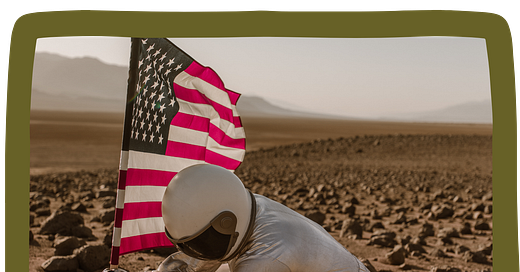Between the Wines is free—like a book club, but with more chaos. Paid subscriptions keep it going and support my writing. If you’re enjoying these essays, please consider upgrading. Cheers! 🍷
“I’m an alien.” - Beautyland by Marie-Helene Bertino
I’ve been thinking a lot recently about how we all stand alone, in one way or another. This idea keeps resurfacing—at book club where we discussed “the other,” and in reading the spectacular Beautyland by Marie-Helene Bertino. It’s a tender story about a woman who doesn’t feel at home on Earth.
In reading the narrator’s observations of human life, including its contradictions and heartbreaks, it became clear that we’re all a little alien, yet we all want to belong. Feeling alien isn’t rare; it’s human.
What’s more alienating, though, than being in a place that promises belonging, but only on someone else’s terms?
Ruminating on her poignant stories, I began thinking: what does it mean to belong when the world feels increasingly hostile?
I’ve written about this before in Moms are the Worst, that our communities become part of our identity. To expand on that, communities, and thus identities, create safety.
A collective becomes an “us,” but inevitably what arises with “us” is its counterpoint, “them.” Unless, of course, the “us” actually includes every human being. These days, it doesn’t.
Community promises sanctuary, but often at the price of uniformity. What becomes of the self when safety requires sameness?
Communities are vital for not feeling alone, but when they come at the expense of others, they are isolating. We’ve all been on the outside of something, which is why we have a natural, human inclination to strive for the communities that would make us safest.
“By far, those who cause the most damage are humans who promise to be some kind of home and are not.” - Beautyland by Marie-Helene Bertino
The protests, the raids, the deportations have all forced me to reconcile what I think it means to be American. What that says about who I am, or who I’m supposed to be. What growing up Catholic meant. These ideals—liberty and justice for all, equal rights, treat others like you want to be treated— have become empty platitudes. Now they are being reserved for ‘us’ not ‘them.’
“Post 9/11: American flags, public anger, excessive I love yous. Adina suspects all three of being in place of other, more authentic expressions... I love you is a can of soda that comes free with every meal. Yet every day humans suffer from the lack of hearing it.” - Beautyland by Marie-Helene Bertino
My alienation is not just personal. It is structural. It is born of an American nationalism that defines itself not by who it includes but by who it excludes.
Grief becomes a kind of data point: a reaction to the dissonance between national ideals and state-sanctioned violence. I cry almost every time I watch a video of the ICE raids or brutality against peaceful protesters. Even the arrest of a US Senator announcing himself and asking a question in a public forum. My heart, the hearts of millions of Americans, are breaking. I rage at the crumbling of American ideals and at the brutal inhumanity this administration has shown its own people.
This is not how I identify as an American. This is not how I identify as someone who cares deeply for others, my community.
I want a safe place for my community. I want to open my communities, however small they are, to those who feel alien.
In Beautyland, Adina laments, “Humans want to find aliens so they feel less alone. They don’t know there is nothing lonelier than an alien.” But here, I think, we can expand. Maybe we all know that loneliness intimately, and I think that’s why people cling to communities that keep others out.
But there is another way to respond to that fear: expansion instead of contraction. I believe people want to believe they are good and that their heart is in the right place. So I ask: what does it look like to live with heart, real compassion, not just performance?
“Human beings fetishize no organ more than the heart. This manifests in language, the heart has its own vocabulary.” - Beautyland by Marie-Helene Bertino
Being an American citizen, a woman, a volunteer, I crave a more expansive ‘us.’ One that doesn’t rely on sameness, but shared vulnerability and radical acceptance. One where there is space for everyone. One where violence and bigotry and fear are pushed out.
“She was American, in that she rarely traveled. Alien, in that she was remote. Human in that she never admitted how remote she felt.” - Beautyland by Marie-Helene Bertino
Maybe the only way to feel less alien is to stop pretending we’re not. To choose each other anyway.
*
See you at the No Kings protest tomorrow!
“Wine! It’s the worst!
Wine is a liquid people pathologize in the way they talk about it, sell it, in the vessels they put it in. Red wine tastes like a dark-walled library and white wine smells like a woman looking away… like many things humans enjoy, it frees them from their bodies. Other examples are blankets and robes.” - Beautyland by Marie-Helene Bertino
So, I’m going to suggest a choose-your-own-adventure here. Adina doesn’t seem to approve, but I will be drinking something sparkly and effervescent with my friends to remind myself what it means to be human.
Please consider clicking the little heart on this essay—your engagement helps more than you think! I’d love to hear from you if this essay made you ~feel~ something, have read a book I recommended, or think I’m wildly off about my wine pairings. 🍷
xx,
bb









beautiful!!